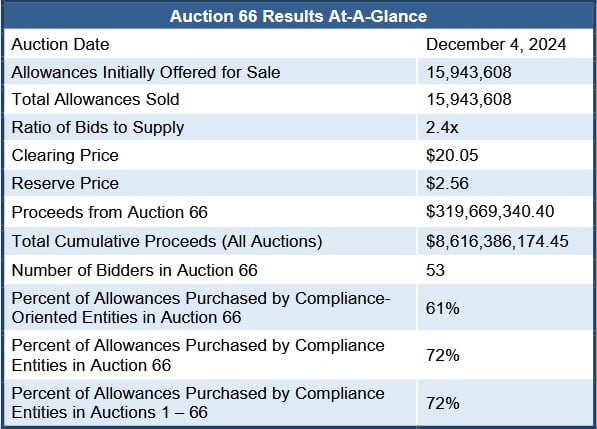RGGI Carbon Auction Prices Fall by 22 Percent

The 66th quarterly carbon auction of the Regional Greenhouse Gas Initiative, or RGGI, the nation’s first market-based emissions regulation program, sold nearly 16 million CO2 allowances at a clearing price of $20.05, according to results released on Dec. 6. The auction generated nearly $320 million bringing total proceeds to about $8.6 billion.
The latest clearing price marks a 22 percent decrease from the last auction, which cleared at $25.75 per allowance. The total number of allowances sold remained consistent with the 65th auction in September. Bids were submitted to purchase 2.4 times the original offering of allowances. Compliance-oriented entities purchased 61 percent of the allowances sold compared to 66 percent in the previous auction.
RGGI’s market-based approach sets an annually declining limit on carbon emissions and allows polluters to buy or sell permits. States participating in the auction are Connecticut, Delaware, Maine, Maryland, Massachusetts, New Hampshire, New Jersey, New York, Rhode Island, and Vermont. Virginia is no longer a participating state as regulation approved last year withdrew the state from RGGI, and a court ruling blocks Pennsylvania’s participation in the multi-state pact.
Last month, the Circuit Court of Floyd County ruled that the regulatory action removing Virginia from RGGI is unlawful and without effect. The court explained that the “only body with the authority to repeal the RGGI Regulation would be the General Assembly.” The decision comes after the Virginia State Air Pollution Control Board, Department of Environmental Quality, and its director, removed the state from RGGI in June 2023. In November 2023, the Fairfax County Circuit Court issued a ruling on a petition challenging a regulation repealing Virginia’s RGGI membership. The Fairfax County Circuit Court judge ruled that the rule had caused “no direct harm” to three of the petitioners – Faith Alliance for Climate Solutions, Appalachian Voices and Virginia Interfaith Power and Light – and hence they lacked standing in the case. Although the Association of Energy Conservation Professionals was found to have a materially different basis for standing, the Circuit Court of Floyd was determined to be the proper venue to make the decision, resulting in granting a motion to transfer the case.
EnerKnol Pulses like this one are powered by the EnerKnol Platform—the first comprehensive database for real-time energy policy tracking. Sign up for a free trial below for access to key regulatory data and deep industry insights across the energy spectrum.
ACCESS FREE TRIAL